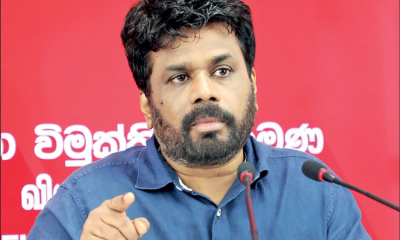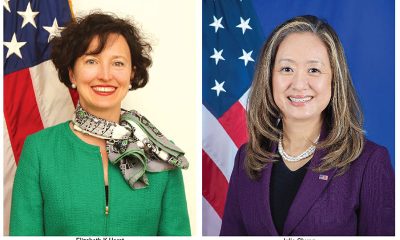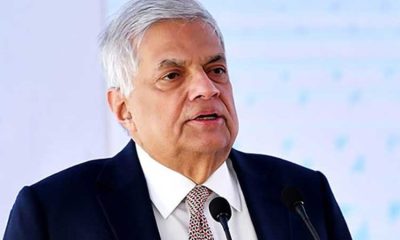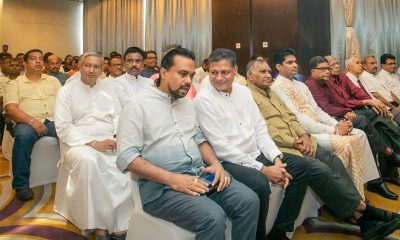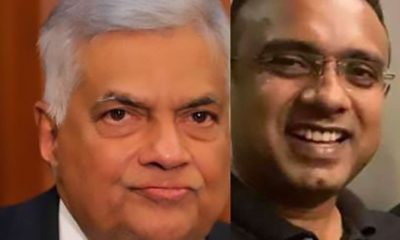Editorial
Beggars’ quarrel

Friday 28th April, 2023
Ruling party MPs and their Opposition counterparts never see eye to eye on anything other than ways and means of feathering their nests. The national interest does not figure, at all, in their scheme of things. So, it is only natural that they are clashing over the IMF bailout, which is to be put to the vote in Parliament.
President Ranil Wickremesinghe, speaking in Parliament, on Wednesday, urged all the MPs to sink their political differences and support the IMF deal, and vowed to grasp the nettle in doing what needs to be done to sort out the economy. It is heartening that he has chosen to act decisively, and one fervently hopes that he will succeed in his endeavour. Populism has been the bane of Sri Lanka’s economy, and tough decisions have to be made regardless of their political fallout to usher in economic stability.
The government’s agreement with the IMF is now a fait accompli, and there is hardly anything that the Opposition could do to effect changes thereto. Arguments for and against the IMF bailout are not based on the merits or demerits thereof. The government MPs are blindly supporting it, and the views of its critics are coloured by their political prejudices. The MPs of both sides of the House act out of expediency and not principle.
There is no way any member of the current Parliament could absolve herself or himself of the blame for the present economic crisis, which has come about due to reckless borrowing, corruption, waste and, above all, the mismanagement of the national economy over the decades. The political parties they represent have either misruled the country or supported corrupt, failed regimes. So, the onus is on these worthies to stop fighting and make a concerted effort to clean up the current economic mess they themselves have created.
The MPs’ right to support or oppose the IMF agreement or anything else for that matter cannot be questioned. But they should not lose sight of the fact that beggars are no choosers. Never do bailouts for bankrupt countries come without constricting conditions. It behoves those who oppose the IMF conditions for assistance to reveal how else they would have sought to tackle the economic crisis. Mere rhetoric will not do.
Wimal vs. Julie
US Ambassador in Colombo, Julie Chung, has sought to rubbish former Minister Wimal Weerawansa’s claim that the US and India were behind the ouster of President Gotabaya Rajapaksa, last year, and she on behalf of Washington urged Speaker Mahinda Yapa Abeywardene to take over the government, at the height of Aragalaya, albeit in vain. Weerawansa’s conspiracy theory has gone viral on the Internet.
Ambassador Chung, however, has not named Weerawansa in her response; issuing a twitter message, she has only said, “I am disappointed that an MP has made baseless allegations and spread outright lies in a book that should be labeled “fiction.” We thought she would issue a detailed response, given the severity of the allegations Weerawansa has levelled against her.
One should not be so naïve as to believe that Weerawansa’s claim at issue is the truth, the whole truth and nothing but the truth. What politicians say should be taken cum grano salis, as is public knowledge, for they are very economical with the truth, which they also stretch as if to the manner born, when they have to safeguard their interests, and the same is true of diplomats who, after all, are said to ‘lie overseas for their countries’.
Thus, it may not be advisable to draw any conclusions solely based on what Weerawansa or Ambassador Chung has said; their claims should be checked against information to be elicited from other sources if doubts anent the alleged conspiracy are to be allayed, if at all. This, we believe, is a task for Parliament, which orders probes at the drop of a hat. When an MP says that a foreign envoy approached the Speaker, and pressured him to take over as the Acting President during a popular uprising, Parliament should hold an investigation and get at the truth.
Weerawansa named names when he claimed that last year the US and India brought pressure to bear on President Gotabaya Rajapaksa to sack Prime Minister Ranil Wickremesinghe before quitting. Gamini Senarath, Secretary to the President, according to Weerawansa, sent two letters to President Rajapaksa, who was in the Maldives, for his signature; one was his resignation letter and the other was to announce the removal of Prime Minister Wickremesinghe, but Gotabaya resigned without removing the PM. It will be interesting to know what Gotabaya, Speaker Abeyewardena and Senarath have to say about Weerawansa’s allegations.
Editorial
Thriving corruption and delayed probes

Past several months have seen some former ministers and ex-state officials being remanded and denied bail ‘to prevent interference with evidence-gathering processes and the intimidation of witnesses. Some of the offences they are charged with were allegedly committed years ago during previous governments. It is while in power that transgressors can cover their tracks by suppressing or eliminating evidence and influencing or intimidating witnesses. Those who are facing legal action for corruption must have resorted to such tactics while their parties were in power. The venal state officials accused of having aided and abetted such alleged transgressions for personal gain, too, must have done likewise. It is therefore doubtful whether holding them on remand for extended periods at present serves the intended purpose.
Politicians and officials should be arrested and remanded immediately after their transgressions come to light if interference with evidence and the intimidation of witnesses are to be prevented. If investigations had been launched into numerous corrupt deals exposed during the Mahinda Rajapaksa government, it would have been possible to bring those responsible for them to justice. Most members of that administration have got away with their corrupt deals.
Various international organisations campaigning against corruption, money laundering, etc., particularly Transparency International, the National Anti-Corruption Commission of Australia, and the United Nations Office on Drugs and Crime, have stressed the importance of swift probes. They have pointed out that investigating corruption immediately after instances thereof come to light is essential for multiple reasons. Early investigations help preserve evidence and deter concealment, which is very common in Sri Lanka. Corrupt politicians are known to hide documents, destroy records or influence witnesses, especially when they are in power. Evidence can be made to disappear making it harder for investigators to get at the truth if investigations are delayed. Equally, prompt investigations are a prerequisite for maintaining public trust in institutions, such as the Commission to Investigate Allegations of Bribery or Corruption, and the rule of law. Protracted delays in conducting investigations invariably create the impression that the system is corrupt, ineffective and biased. Early action increases the chances of successful prosecution and deterrence.
It is against this backdrop that several damning allegations of corruption against the incumbent government should be viewed. The JVP/NPP came to power, promising what it described as ‘a system change’ to eliminate bribery and corruption and other such social evils. But it is apparently emulating its predecessors in handling allegations against its senior members. It vilifies whistle-blowers, denies allegations and delays investigations. Worse, the CID is headed by a prominent member of the Retired Police Collective of the NPP, and its integrity is therefore compromised.
A huge stock of coal imported for power generation has been found to be substandard. The low calorific value of the coal has resulted in low power output per tonne, and engineers have warned that the use of low-quality coal could damage the machinery of the Norochchoalai power plant. Staggering losses the Ceylon Electricity Board has suffered by importing substandard coal are expected to be passed on to the public in the form of tariff hikes. The government is accused of having interfered with the tender process to facilitate the registration of the company which supplied the low-quality coal. What needs to be done immediately is to probe the allegation that the bidding process was delayed to enable the supplier concerned to be registered. A delay in launching an investigation into the alleged coal procurement racket will help the culprits cover their tracks.
A Parliamentary Select Committee (PSC) probe has been launched into the green-channelling of as many as 323 red-flagged freight containers through the Colombo Port in January 2025. The uninspected cargo may have included narcotics and lethal weapons, the Opposition has claimed. It has been alleged that the high-risk containers were released at the behest of a powerful minister. So, one can argue that the government helped cover his tracks before launching a parliamentary probe. Only the naïve will expect a PSC, dominated by the NPP MPs and headed by a minister, to reveal anything that is detrimental to the interests of the NPP government.
Keheliya Rambukwella was arrested over a procurement racket in the Health Ministry while he was a minister in the previous government. True, that beleaguered administration had to throw him to the wolves for want of a better alternative. But the fact remains that his arrest and remand helped protect the evidence-gathering process, among other things. Why no arrests have been made over the release of 323 high-risk containers without Customs inspection, and the procurement of substandard coal, under the ‘clean’ NPP government, is the question.
Editorial
Govt. provoking TUs

Saturday 31st Junuary, 2026
The government has ignored the ultimatum given by the Government Medical Officers Association (GMOA). Its intransigence will only drive the protesting doctors to intensify their trade union action, causing more suffering to patients.
The government has launched a propaganda campaign to turn public opinion against the GMOA by claiming that the doctors are demanding pay hikes with no heed for the economic difficulties caused by Cyclone Ditwah. It has stretched the truth to bolster its claims, suppressing the fact that the protesting doctors have softened their stand and expressed their willingness to give up their trade union action if the government addresses the issues the resolution of which does not cost the state coffers anything. According to media reports, their demands include the establishment of a special service minute for doctors, enhancing the disturbance, availability, and transport allowance, converting the extra duty allowance into a fixed one, and the implementation of a written agreement with the Health Minister on resolving issues regarding a research allowance and transport.
What the government should do to prevent disruptions to the health sector is to bring the GMOA to the negotiating table forthwith and work out a compromise formula. But it has succumbed to the arrogance of power, which drives strong governments to bulldoze their way through. Health Minister Dr. Nalinda Jayatissa has told the doctors that it’s his way or the highway.
The government is apparently cherishing the delusion that since it has a steamroller majority in Parliament, it can do as it pleases, and others have to obey its dictates. Let it be warned that it is inviting trouble. Mandates come with short lifespans, and hubris and downfall are neighbours. Its efforts to neutralise the GMOA have galvanised other health sector trade unions into joining forces; they know that if the government succeeds in flooring the GMOA, so to speak, they will have no chance whatsoever of winning their demands. It is popularly said in this country that “one who lays one’s hands on the gourd does not spare the pumpkin”. In fact, that seems to be the government’s strategy. It is dealing with protesting trade unions in such a way as to deter others from launching labour struggles. It has chosen to ignore a hunger strike by the Development Officers (DOs), attached to the state-run schools; they demanding that they be absorbed into the teacher service. The protesters campaigned hard for the JVP/NPP in the 2024 elections, expecting their fair demand to be met. These graduates have worked as teachers for about seven years, and there is no reason why the government cannot appoint them as teachers; they can be further trained, if need be, after being appointed as teachers. The DOs have received the typical karapincha (curry leaves) treatment from the government they helped elect—they have been used and discarded. The government has shown a callous disregard for not only their career prospects but also their dear lives. The DOs were informed yesterday evening that they could meet President Anura Kumara Dissanayake on Tuesday (03 Feb). But NPP MP Chandna Sooriyaarachchi revealed to the media yesterday that all arrangements had been made for a competitive examination to be held soon!
The GMOA used to give short shrift to other health sector trade unions, and go to the extent of being critical of their labour struggles. It was labouring under the misconception that the state health institutions could operate without other categories of workers. They even sought to establish what may be described as a health sector trade union hierarchy modelled on the four-varna caste system, and place themselves at the top. Now, they have realised the need to cooperate with other trade unions instead of confronting them.
If the health sector trade unions close ranks, they will stand a better chance of winning their demands, and labour unions in other sectors will follow suit to boost their bargaining power. The government continues to provide its political opponents and trade unions with rallying points. Governments intoxicated with power think no end of themselves and behave like aggressive drunkards in shebeens only to receive sobering knocks in elections.
Editorial
Listen to workers

Friday 30th January, 2026
Time was when governments inveighed against the JVP for instigating strikes in vital sectors to further its political interests. Today, a JVP-led government is accusing its political rivals of manipulating trade unions to advance their political agendas on the pretext of championing workers’ rights. Following the 2024 regime change, it was widely thought that the country would at last be free from strikes as the JVP, the main instigator of strikes, had gained state power. During the initial phase of the JVP-NPP rule, all was quiet on the trade union front, but labour disputes began to manifest themselves thereafter.
Development Officers (DOs), attached to the state-run schools, have been protesting near the Presidential Secretariat, Colombo, for four days, demanding that they be absorbed into the teacher service without being made to sit a competitive examination. Some of them were on a hunger strike at the time of writing, claiming that the government had denied them an opportunity to be heard.
The NPP administration is thought to be in a straitjacket where state sector recruitment is concerned. It has to curtail government expenditure in keeping with the IMF bailout conditions. But pressure is mounting on it to fulfil its pledges to the unemployed graduates and the DOs, who campaigned hard for the JVP/NPP in the 2024 presidential and parliamentary elections. In 2024, a few weeks after forming a government, the NPP had a DOs’ protest near the Education Ministry in Battaramulla dispersed by the police!
The state service, bursting at the seams, has become a main source of employment for ruling party supporters over the past several decades. Sri Lanka currently has about 1.5 million public sector employees, with the workforce having doubled over the past one and a half decades. Although there is one public official for every 14 citizens, the efficiency of the state service remains extremely low. Only the UNP-led UNF government (2001-2004) sought to address this issue and curtailed state sector recruitments. But the then President Chandrika Bandaranaike Kumaratunga sacked that government, and the SLFP-led UPFA, which came to power by winning the 2004 general election, upended the UNF’s recruitment policy and resumed making political appointments in the state sector.
By some quirk of fate, the JVP, which pressured all previous governments to employ graduates in the state sector, is now under fire for not recruiting some graduates as teachers.
Opinion may be divided on the protesting DOs’ demand at issue. But it defies comprehension why the government wants them to sit a competitive examination, for they have worked as teachers for years. They have had hands-on experience in schools, and the question is why they are not appointed as teachers straightaway.
The government, which claims to espouse Marxism, ought to talk to protesters and strikers instead of trying to intimidate them into submission. Let it be repeated that in the past, the JVP was behind almost all strikes, demanding solutions to workers’ problems. Unfortunately, it is now riding roughshod over trade unions and workers. It is playing a game of chicken with the Government Medical Officers’ Association (GMOA), and the protesting doctors have given Minister of Health Dr. Nalinda Jayatissa 48 hours to address their problems or face the consequences. It is hoped that he will invite the doctors on the warpath to the negotiating table and try to avert a health sector strike.
There is no way hospitals can function during a doctors’ strike, and it will be a mistake for the government to wait, expecting the GMOA to blink first. It must get protesters, including doctors and the DOs around the table, and have a serious discussion on the unresolved issues that have driven them to resort to trade union action.
-

 Business7 days ago
Business7 days agoComBank, UnionPay launch SplendorPlus Card for travelers to China
-

 Business4 days ago
Business4 days agoClimate risks, poverty, and recovery financing in focus at CEPA policy panel
-

 Opinion3 days ago
Opinion3 days agoSri Lanka, the Stars,and statesmen
-

 Business2 days ago
Business2 days agoHayleys Mobility ushering in a new era of premium sustainable mobility
-

 Opinion7 days ago
Opinion7 days agoLuck knocks at your door every day
-

 Business2 days ago
Business2 days agoAdvice Lab unveils new 13,000+ sqft office, marking major expansion in financial services BPO to Australia
-

 Business2 days ago
Business2 days agoArpico NextGen Mattress gains recognition for innovation
-

 Editorial2 days ago
Editorial2 days agoGovt. provoking TUs


